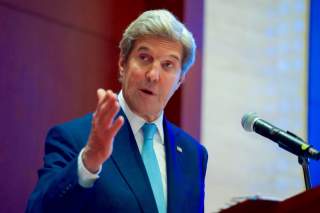$400 Million to Iran: The Facts on an Overblown Story
Obama has the facts on his side, but there's a real perception problem.
Thanks to the Wall Street Journal, politicos, White House reporters, and the State Department press corps are talking about something other than the 2016 presidential election. But to the Obama administration's great regret, the story has nothing to do with a diplomatic triumph or a Supreme Court victory; instead, it's about $400 million in cash being loaded into an unmarked plane and sent to Iran at roughly the same time five American hostages were released by the Iranian Government. It's further granular detail on a six-month old story that administration officials are now trying to bat away as insignificant.
Good luck to them.
White House Press Secretary Josh Earnest spent most of his daily briefing on Wednesday, August 3, answering probing questions from the press about why President Obama or his foreign policy officials didn't let the media know when the first $400 million of a $1.3 billion settlement was disbursed; why the money was sent to Iranian officials on the same day as five American citizens were released from Iranian custody; why the money was sent in a form that would difficult to trace; and why this arrangement shouldn't be called a ransom payment when there are so many coincidences involved. Responding to Margaret Brennan of CBS News as to why the administration wasn't being fully transparent about the exact arrangement, Earnest said the details were irrelevant. "We acknowledged...back on January 17th, that there would be all kinds of innuendo hurled by people who oppose engagement with Iran," Earnest said. "I recognize that the details that you're seeking to elicit might make for a colorful news story, but they don’t change the facts."
Here are the facts:
-After two years of intensive negotiations between Secretary of State John Kerry, Iranian Foreign Minister Mohammad Javad Zarif (and even more discussions between their staffs), the U.S. State Department and Iranian Foreign Ministry developed a certain amount of respect for one another. Due to over three decades of adversarial relations and extensive disagreements on issues ranging from Tehran's support for the Assad regime to its testing of ballistic missiles, American and Iranian officials were still rightfully distrustful of one another's motives. But even with that distrust hanging over the table, Washington and Tehran were able to generate an agreement on the latter's nuclear program. The two-year stint of talks not only produced a comprehensive nuclear deal, but opened up opportunities to address other problems like the decades-old financial claim at The Hague and the imprisonment of American citizens on Iranian soil.
-On January 17, 2016, President Obama addressed the American people through a written statement explaining what exactly occurred. "[B]y working with Iran on this nuclear deal," Obama wrote, "we were better able to address other issues." One of those other issues was the coordinated release Americans in Iranian custody in exchange for Iranians in American custody. And the final track was the compromise hatched out between each country's legal team that settled the dispute over a Shah-era weapons deal that was nullified shortly after the mullahs took power.
-Three separate teams were dealing with three separate problems that were not at all related to one another. But they all happened to be finalized at the same time, which can occur in the world of diplomacy.
The Obama administration has the facts on its side. However, what they also have is a perception problem: when the $400 million payment coincides with the freeing of Americans in captivity, Republican lawmakers in Washington who never liked engagement with the Iranians in the first place (on any issue) automatically assume that there was a quid-pro quo involved. Senators Tom Cotton, Marco Rubio, and Ted Cruz—three lawmakers who vigorously campaigned to block the Iran nuclear agreement from passing last summer—are all describing the coincidence as a ransom payment in order to get American prisoners who were unjustly detained out of Tehran's prison system. Chairman Jason Chaffetz of the House Oversight Committee has already demanded that Secretary of State Kerry testify on the entire arrangement. In the meantime, he wants information from the State Department, including "[a]ll documents and communications referring or relating to any pending payments from the United States to the Islamic Republic of Iran for the release of American hostages currently being detained.”
The administration, though, is not off the hook. This latest controversy over the Iran agreement is more than a P.R. problem for the White House, because it reinforces a belief already firmly embedded within the Republican Party that Obama and his advisers aren't forthcoming with Congress. In terms of transparency with Congress and the American people, the details are in fact relevant, despite what Josh Earnest may believe. The laissez-faire nature of his response smacks of arrogance and tone-deafness, as if members of Congress—and most importantly of all the American people—don't have a right to know when, how, and in what form payments to Tehran are being processed.
As to an Iran Contra–like conspiracy that some Republicans are ginning up, that's a bridge too far.
Daniel R. DePetris has written for CNN.com, Small Wars Journal and the Diplomat.
Image: “U.S. Secretary of State John Kerry answers a Laotian reporter's question at the National Convention Center in Vientiane, Laos, on July 26, 2016, during a news conference amid the annual meeting of the Association of Southeast Asian Nations (ASEAN). [State Department Photo/Public Domain]”

